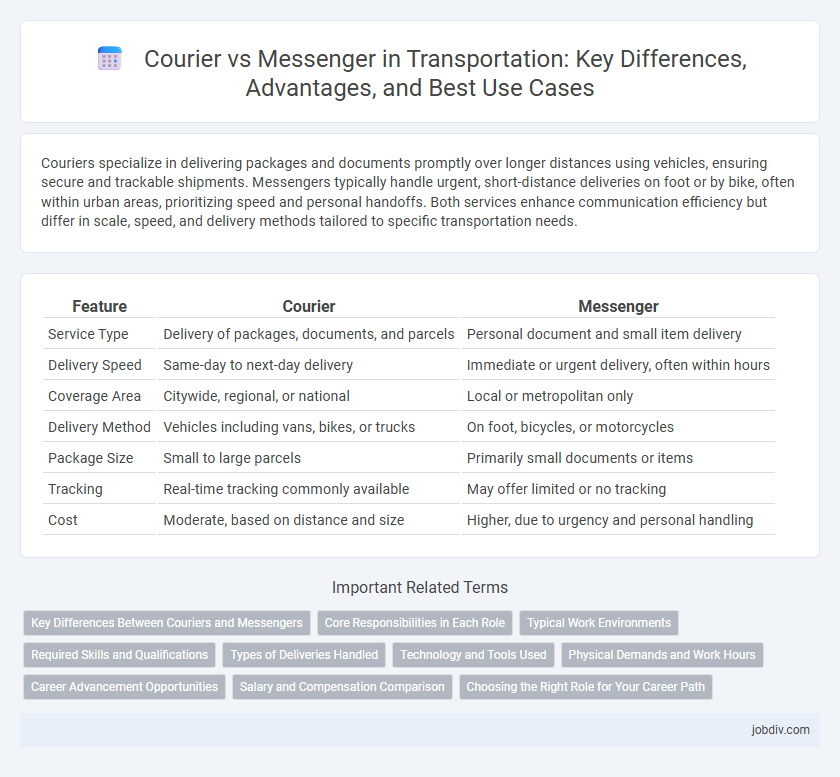Couriers specialize in delivering packages and documents promptly over longer distances using vehicles, ensuring secure and trackable shipments. Messengers typically handle urgent, short-distance deliveries on foot or by bike, often within urban areas, prioritizing speed and personal handoffs. Both services enhance communication efficiency but differ in scale, speed, and delivery methods tailored to specific transportation needs.
Table of Comparison
| Feature | Courier | Messenger |
|---|---|---|
| Service Type | Delivery of packages, documents, and parcels | Personal document and small item delivery |
| Delivery Speed | Same-day to next-day delivery | Immediate or urgent delivery, often within hours |
| Coverage Area | Citywide, regional, or national | Local or metropolitan only |
| Delivery Method | Vehicles including vans, bikes, or trucks | On foot, bicycles, or motorcycles |
| Package Size | Small to large parcels | Primarily small documents or items |
| Tracking | Real-time tracking commonly available | May offer limited or no tracking |
| Cost | Moderate, based on distance and size | Higher, due to urgency and personal handling |
Key Differences Between Couriers and Messengers
Couriers specialize in the secure and timely delivery of packages, documents, and parcels, often offering tracking and insurance services, while messengers primarily handle the hand delivery of documents and small items within localized areas, such as business districts. Couriers typically operate with a wider geographic reach, using various transportation modes including bikes, cars, and air freight, whereas messengers generally cover short distances on foot or by bike. The delivery speed and service reliability are higher with couriers due to their network infrastructure, making them suitable for urgent and bulk deliveries compared to the personalized, immediate service provided by messengers.
Core Responsibilities in Each Role
Couriers primarily handle the secure and timely delivery of packages, documents, and parcels, often using various transportation modes such as bikes, cars, or vans to navigate urban or long-distance routes. Messengers focus on urgent document delivery and face-to-face communication within a localized area, typically operating on foot, by bike, or using public transit to ensure swift hand-to-hand transfers. Both roles require attention to accuracy and reliability, but couriers emphasize logistics and package management while messengers prioritize speed and direct client interaction.
Typical Work Environments
Couriers typically operate within logistical hubs, warehouses, and urban delivery routes, often using vehicles to transport packages over longer distances. Messengers usually work in office buildings, campuses, or city centers, delivering documents and small parcels by foot, bicycle, or motorcycle. Both roles require navigating dense traffic and time-sensitive environments to ensure prompt delivery.
Required Skills and Qualifications
Courier roles demand strong time management skills, knowledge of efficient route planning, and the ability to handle packages carefully to ensure safe delivery. Messenger positions require excellent communication abilities, quick decision-making, and familiarity with local geography for prompt message delivery. Both roles often need a valid driver's license, reliability, and physical stamina to meet tight deadlines effectively.
Types of Deliveries Handled
Couriers specialize in handling a wide range of deliveries including parcels, documents, and express mail, often covering long distances with tracking and insurance options. Messengers typically manage local, time-sensitive deliveries such as legal documents, medical specimens, or urgent business papers within city limits. Both services prioritize speed and reliability but differ in the scope and scale of deliveries handled.
Technology and Tools Used
Couriers utilize GPS tracking systems and automated route optimization software to ensure timely deliveries and real-time package monitoring. Messengers often rely on mobile communication devices and digital signature capture tools to facilitate quick, local handoffs and immediate proof of delivery. Both leverage smartphone apps and barcode scanning technology, but couriers typically employ larger-scale inventory management systems to handle high-volume shipments.
Physical Demands and Work Hours
Couriers often face higher physical demands due to long-distance travel and frequent heavy package handling, requiring stamina and strength for extended delivery routes. Messengers typically have shorter, localized routes with lighter loads, but they work under tight schedules and may cover significant walking or biking distances. Work hours for couriers can be irregular and lengthy, especially during peak delivery times, while messengers usually have more consistent hours aligned with business operating times.
Career Advancement Opportunities
Courier roles typically offer structured career advancement through specialized logistics and distribution management positions, emphasizing efficiency in parcel delivery and route optimization. Messenger careers often provide progression within administrative and corporate environments, advancing to roles such as office manager or executive assistant where interpersonal and organizational skills are paramount. Both paths require strong time management and reliability, but couriers may access broader opportunities in supply chain and transportation sectors.
Salary and Compensation Comparison
Courier salaries typically range from $28,000 to $40,000 annually, while messenger positions often offer between $25,000 and $38,000, reflecting slight variations based on experience and location. Compensation packages for couriers may include per-delivery bonuses and mileage reimbursement, whereas messengers might receive fixed hourly wages with fewer incentives. Demand fluctuations and job complexity heavily influence earnings in both roles within the transportation sector.
Choosing the Right Role for Your Career Path
Selecting between a courier and a messenger role depends on your career goals and preferred work environment. Couriers typically handle time-sensitive packages over longer distances using vehicles, offering opportunities in logistics and delivery companies, while messengers often deliver documents within a local area on foot or by bike, suited for office settings or urban environments. Understanding these differences helps align your skills and ambitions with the right transportation career path.
Courier vs Messenger Infographic

 jobdiv.com
jobdiv.com